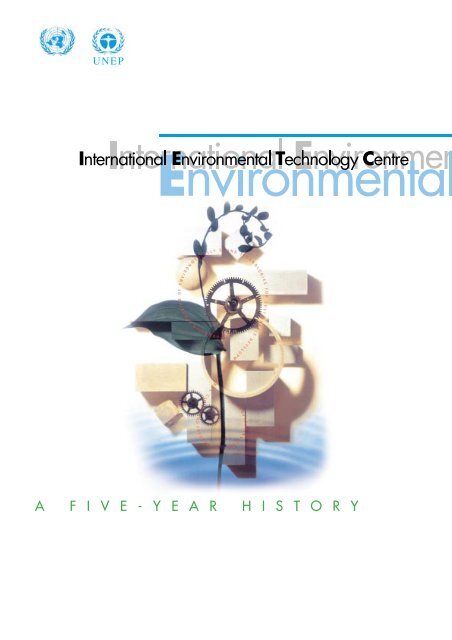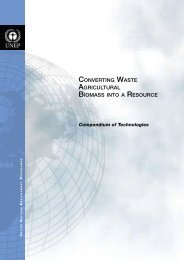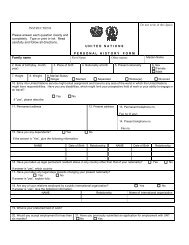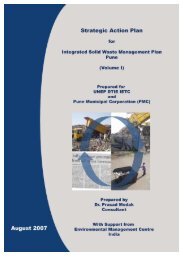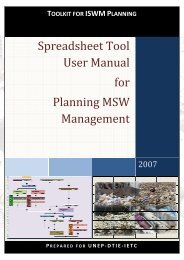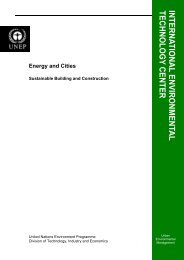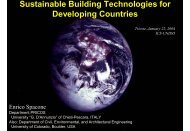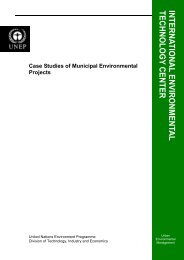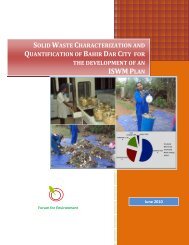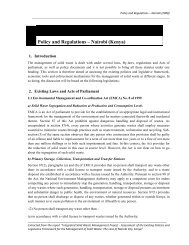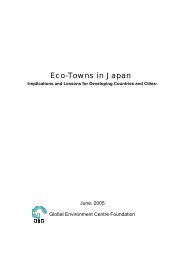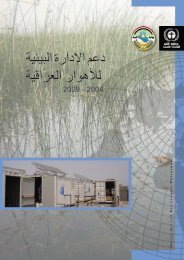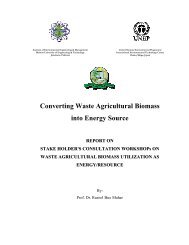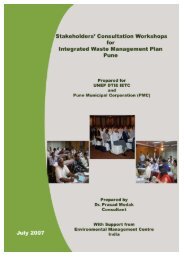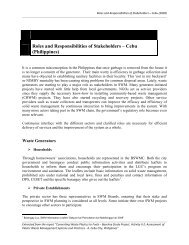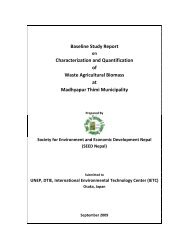Activities - International Environmental Technology Centre
Activities - International Environmental Technology Centre
Activities - International Environmental Technology Centre
Create successful ePaper yourself
Turn your PDF publications into a flip-book with our unique Google optimized e-Paper software.
Agenda 21<br />
Agenda 21 is the worldwide environmental<br />
action plan for sustainable development of<br />
the 21st century adopted at the Earth<br />
Summit in Rio de Janeiro in 1992.<br />
C ontents<br />
Our RoleEstablishment of IETC in 1994<br />
............................................................... 1<br />
Greetings<br />
........................................................... 2,3<br />
Our Focus and Approaches<br />
........................................................... 4,5<br />
Our Performance and Achievements<br />
........................................................... 6,7<br />
<strong>Activities</strong> Since 1994<br />
....................................................... 811<br />
Products<br />
........................................................ 12,13<br />
Partnership<br />
............................................................. 14<br />
Profile<br />
..................................................... 1524<br />
Cover : IETC promotes environmentally sound technologies for sustainable development of cities,<br />
symbolized with bricks and wheels, and freshwater, symbolized with blue ripples.
Our Role<br />
Our Role<br />
Establishment of IETC in 1994<br />
The <strong>International</strong> <strong>Environmental</strong> <strong>Technology</strong> <strong>Centre</strong><br />
was established by the United Nations Environment<br />
Programme (UNEP) in 1994 to strengthen UNEP's<br />
role in the sustainable management of urban areas<br />
and freshwater basins. IETC's main role is to<br />
promote application, adoption and use of<br />
<strong>Environmental</strong>ly Sound Technologies (ESTs) for<br />
sustainable development of cities and freshwater<br />
basins in developing countries and<br />
countries with economies in transition.<br />
UN<br />
The United Nations officially<br />
came into existence on<br />
24 October 1945, when<br />
the United Nations Charter was ratified<br />
for global efforts to solve problems<br />
which challenge humanity.<br />
Cooperating in this effort are<br />
more than 30 affiliated organizations,<br />
known together as the UN system.<br />
UNEP<br />
UNEP was established in 1972 to<br />
provide leadership and encourage<br />
partnerships in caring for the<br />
environment by inspiring, informing and<br />
enabling nations and peoples to<br />
improve their quality of life without<br />
compromising that of future generations.<br />
Imagine putting an enormous bell jar over a city.<br />
What would happen? Just as no animal can cope on its<br />
own, no city can manage without its outlying rural areas.<br />
(Adapted from "mini-report II" of the Swedish Association<br />
of Local Authorities)<br />
1
Greetings<br />
Greetings<br />
Congratulatory Message from Executive Director of UNEP to IETC<br />
As we enter the new millennium we are grappling with a range of environmental<br />
challenges - pollution of freshwater and water shortages, loss of fertile soils, air pollution,<br />
climate change, ozone depletion, species extinctions, water management and rapid<br />
urbanisation. In charting a new course for global environmental policy, we must not only<br />
look for the causes of these environmental problems, but also for sustainable solutions.<br />
This means, for example, promotion of more sustainable ways of using water and<br />
producing energy, including increased efficiency; raised environmental awareness among<br />
the public, and innovative local solutions to environmental problems in all countries of the<br />
world. To help develop and implement sustainable solutions the <strong>International</strong> <strong>Environmental</strong><br />
<strong>Technology</strong> <strong>Centre</strong> (IETC) was established in April 1994 by the agreement between the<br />
United Nations Environment Programme (UNEP) and the Government of Japan. It has two<br />
offices in Japan - Osaka City and Kusatsu City, Shiga Prefecture. Since its establishment,<br />
IETC has been supported by two Japanese foundations - the Global Environment <strong>Centre</strong><br />
Foundation (GEC) and the <strong>International</strong> Lake Environment Committee Foundation (ILEC).<br />
The <strong>Centre</strong>'s main function is to promote the adoption of <strong>Environmental</strong>ly Sound<br />
Technologies (ESTs) in developing countries and countries with economies in transition. IETC pays specific attention to<br />
urban problems, such as energy management, sewage, air pollution, solid waste and to the management of<br />
freshwater basins.<br />
IETC's mandate is based on Agenda 21, which came out of the UNCED process held in Rio de Janeiro in 1992.<br />
To deliver its mandate IETC focuses on three main approaches: (1) Improving access to information on ESTs;<br />
(2) Fostering technology cooperation, partnerships, adoption and use of ESTs; and (3) Capacity building.<br />
In welcoming the new millennium IETC has decided to publish a Five-year Report (1994-1999), which summarizes<br />
the yearly activities of IETC. I welcome this initiative by IETC to further communicate its mission and programmes to its<br />
broad range of stakeholder groups.<br />
Former German Federal Minister for the<br />
Environment, Nature Conservation and<br />
Nuclear Safety and also for Regional<br />
Planning, Building and Urban Development<br />
and Coordinator for the Transfer of the<br />
Parliament and Federal Government to<br />
Berlin and Compensation for the Bonn<br />
Region. United Nations Under-Secretary-<br />
General.<br />
..<br />
Dr. Klaus Topfer, UNEP<br />
2
From the Government of Japan<br />
On behalf of the host government, I would like to congratulate the issuance of its Fiveyear<br />
Report in which IETC's activities are compiled as one of various products of IETC<br />
since its establishment.<br />
With the recognition of the importance of smooth technology transfer to<br />
developing countries to deal with environmental issues, the Government of Japan<br />
invited IETC to Japan in 1990. IETC has been highly evaluated as an organization to<br />
tackle urban environmental problems and water issues in UNEP through effective<br />
technology transfer to the developing countries and countries with economies in<br />
transition. The Government of Japan, as the top donor, has since then contributed<br />
approximately US$19 million to support IETC's activities.<br />
It is considered that the urban environmental problems and water issues are<br />
becoming more and more crucial for human beings in the world. It can be said that<br />
many countries have not yet taken the sufficient measures in solid waste and<br />
wastewater management, atmospheric pollution, noise problem, chemical compounds<br />
and the other environment-related matters. More than 90 per cent of the Earth's water<br />
is seawater and the freshwater accounts only for a few per cent. This scarce freshwater<br />
is the essential resource for the lives of human beings and the other creatures on the Earth. The water issue, just like<br />
food problem, will be the one of the most crucial matters with which we have to grapple in the next century.<br />
We will be facing to new challenges in the 21st century. As the forefront organization to tackle with these issues,<br />
I wish IETC further success and also its activities to become well known to the public through this Report for IETC's<br />
securing further support from the international communities.<br />
Joined Ministry of Foreign Affairs in 1969 and<br />
have been engaged in the various fields such<br />
as Intelligence and Analysis Bureau and<br />
Foreign Policy Bureau as Minister at the<br />
Embassy of Japan in Indonesia, Ambassador<br />
of Japan to UN in New York.<br />
Mr. Yukio Takasu, MOFA<br />
From Global Environment <strong>Centre</strong> Foundation<br />
On behalf of Global Environment <strong>Centre</strong><br />
Foundation (GEC) I extend my warmest<br />
congratulations on the publication of the<br />
Five-year Report by IETC at the beginning<br />
of the new millennium.<br />
As one of IETC's supporting<br />
foundations, GEC has contributed to assist<br />
IETC's activities such as the provision of<br />
cooperation staff who have expertise to<br />
practically contribute to IETC's planning<br />
and implementation of projects. GEC also<br />
joined the project team to initiate IETC's<br />
information tool on environmental<br />
technologies called maESTro which was<br />
introduced in April 1997. Aside from<br />
collecting information, planning,<br />
developing and disseminating maESTro,<br />
we contributed to provide information on environmental<br />
technologies obtained through research to be incorporated into<br />
maESTro. GEC has also assisted IETC in organizing symposia<br />
and seminars and issuing newsletters and publications in order to<br />
disseminate IETC's activities.<br />
I wish that this Report will be very useful for future IETC's<br />
activities and GEC's continuous involvement. With close<br />
cooperation with the other supporting foundation, <strong>International</strong><br />
Lake Environment Committee Foundation (ILEC), GEC will make<br />
best efforts to further support IETC.<br />
I wish IETC to widen its activities to continue to prosper.<br />
Former President and Professor<br />
Emeritus of Osaka University. Serving<br />
currently as commissioner of the<br />
Prime Minister's Council for Science<br />
and <strong>Technology</strong>, President and<br />
Director General of the Institute of<br />
Nuclear Safety Systems, Inc. and<br />
President of the Calamity Science<br />
Institute.<br />
Dr. Nobuaki Kumagai,<br />
GEC<br />
From <strong>International</strong> Lake Environment<br />
Committee Foundation<br />
In commemoration of the issuance of<br />
IETC's Five-year Report, I, on behalf of<br />
<strong>International</strong> Lake Environment Committee<br />
Foundation (ILEC), would like to make a<br />
congratulatory statement.<br />
The global environment has drastically<br />
changed for the last five years. The lakes<br />
and reservoirs for which ILEC has worked,<br />
have been recognized as one of the crucial<br />
elements in the ecosystem. In particular,<br />
water, as the essential resource for human<br />
beings, is foreseen to be scarce in the<br />
21st century.<br />
ILEC has cooperated with IETC to<br />
accumulate information related to the<br />
environment and management of lakes and reservoirs throughout<br />
the world, to transfer environmentally sound technologies to the<br />
developing countries and to provide the information through<br />
the internet. In cooperation with IETC, several conferences and<br />
training programmes will be held in 2000. ILEC also plans in 2001<br />
to hold the 9th World Lake Conference in Shiga which will be the<br />
first international conference on environment in the 21st century<br />
in Japan.<br />
I wish that for the closer relations with IETC, ILEC will raise the<br />
public awareness on the importance of lakes and reservoirs at the<br />
various international conferences and promote technology transfer<br />
to the developing countries through its training as well as taking<br />
further positive actions to preserve the lakes in the world.<br />
After the experience of 27 years at the<br />
Ministry of Welfare and 5 years at the<br />
Environment Agency as Director<br />
General of the Planning Coordination<br />
Bureau and Administrative Vice-<br />
Minister, he was appointed the<br />
chairman of Bayer in Japan.<br />
Mr. Kei Yamazaki, ILEC<br />
3
Our Focus<br />
Freshwater, therefore, is a scarce resource, often a limiting factor<br />
Our Focus and Approaches<br />
Our Focus and Approaches<br />
ur Focus and Approaches<br />
At IETC we pay specific attention to the promotion, adoption and use of<br />
<strong>Environmental</strong>ly Sound Technologies (ESTs) in helping solve urban<br />
environmental problems such as water quality, sewage, solid waste,<br />
energy, urban sprawl, land contamination, transport, air pollution and<br />
noise. With urban populations growing two and a half times faster<br />
than its rural counterpart, the UN estimates that the level of urban<br />
population will cross the 50 per cent mark in 2005. By 2025, more than<br />
60 percent of the world's population will live in urban areas.<br />
The estimated urban population in that year will be approximately<br />
5.4 billion, of whom 77 per cent will live in developing countries.<br />
The management of freshwater basins is also of prime concern to<br />
IETC and lakes are one of the planet's most important freshwater<br />
resources providing water for urban, agricultural and industrial uses for<br />
much of the world's population. We are all familiar with the image of<br />
the Earth as the "blue planet" when seen from space. It gives<br />
the impression that water is plentiful and indeed it is. However, pictures<br />
can be deceiving. Freshwater only accounts for 2.15 per cent of all the<br />
Earth's water. But even that percentage is deceiving because 99.5 per<br />
cent of all surface freshwater is locked away in continental ice.<br />
for development, and one which we should take great care to protect.<br />
4<br />
KANSAI Area<br />
Lake Biwa<br />
SHIGA<br />
OSAKA<br />
4
How to be supported<br />
GEC<br />
Global Environment <strong>Centre</strong> Foundation<br />
ILEC<br />
<strong>International</strong> Lake Environment Committee Foundation<br />
Cities<br />
polluting<br />
consuming<br />
Freshwater<br />
The Global Environment<br />
<strong>Centre</strong> Foundation (GEC)<br />
contributes its expertise in<br />
urban environment<br />
management and the<br />
sustainable development of<br />
large cities around the world.<br />
The <strong>International</strong> Lake<br />
Environment Committee<br />
Foundation (ILEC)<br />
contributes its substantial<br />
knowledge of the<br />
environmentally sustainable<br />
management of freshwater resources.<br />
Cities are the biggest consumers of freshwater, while being the biggest polluters.<br />
As both issues are closely interlinked with each other, IETC tries to tackle both issues<br />
in relation to the other.<br />
OSAKA<br />
SHIGA<br />
Three Major Approaches<br />
-2<br />
The IETC strategy is based primarily on Agenda 21, which emerged from the 1992 United<br />
Nations Conference on Environment and Development. In addressing urban and freshwater<br />
problems, IETC, instead of addressing each problem directly, tries to support initiatives of<br />
relevant governments and decision-makers, so that they can choose the most appropriate<br />
sustainable options based upon their needs. To this end, IETC takes three inter-connected<br />
approaches: (i) by providing better access to information on ESTs, (ii) offering capacitybuilding<br />
training for appropriate decision-making, and (iii) fostering partnerships<br />
among stakeholders.<br />
In order to provide better access to information on ESTs, IETC developed a searchable<br />
directory called ''maESTro''. It is a tool to collect information on ESTs from disparate sources<br />
around the world, and to make them available for everybody in all<br />
different media such as floppy diskettes, CD-ROMs, the Internet and<br />
printed reports. IETC also distributes printed publications, newsletters both<br />
in print and on the Internet.<br />
In order for people to better utilize the information and make<br />
appropriate decisions based on it, IETC develops training modules<br />
Improving access to<br />
information on<br />
<strong>Environmental</strong>ly<br />
Sound Technologies<br />
appropriate for developing countries and countries with economies in<br />
transition. These modules are particularly designed to build the<br />
capacities of national and local decision-makers to manage their<br />
environment and deal with environmental problems.<br />
Lastly, in order to implement any decisions, IETC fosters<br />
technology cooperation and partnerships regarding the successful<br />
adoption and use of ESTs by providing a range of advisory services.<br />
Fostering technology<br />
cooperation,<br />
partnerships and<br />
transfer<br />
Capacity building<br />
A F I V E - Y E A R H I S T O R Y<br />
5
World Wide<br />
Over the last five years, gradually, IETC has attained recognition as<br />
a global centre that is an integral part of UNEP. Motivated by the<br />
desire to promote the transfer of environmentally sound<br />
technologies to all countries in the developing parts of the world,<br />
our accomplishments this far are modest but significant.<br />
We have maintained our image as an international centre.<br />
Our information and capacity building services are serving the<br />
world and reaching out to all our beneficiary countries and clients.<br />
IETC publications are distributed globally; and the information<br />
system and management tool, maESTro, is a global, comprehensive<br />
information directory of ESTs, that is appreciated for its objectivity<br />
and neutrality; and our partners, collaborators and supporters are<br />
governments, public and private institutions, organizations and<br />
agencies from all over the world.<br />
IETC reports that as of 1999 IETC, since 1994, has undertaken<br />
activities that have reached almost 98 per cent of the total number<br />
of developing countries and countries with economies in transition.<br />
The only countries where our information materials and services<br />
have not reached are those that are unreachable because of war,<br />
conflicts and other hazards that bar normal postal services and<br />
communications: for example, Afghanistan, Angola, Sierra Leone<br />
and a few others.<br />
IETC's global research projects have produced a series of<br />
publications, i.e., an <strong>International</strong> Sourcebooks on <strong>Environmental</strong>ly<br />
Sound Technologies for Municipal Solid Waste Management in<br />
1996; Regional Sourcebooks on Alternative Technologies for<br />
Freshwater Augmentation in 1995-1997, which covered in<br />
separate volumes the regions of Africa, Asia, Central and Eastern<br />
Europe, and Latin America and the Caribbean; and a book on the<br />
Planning and Management of Lakes and Reservoirs in 1999.<br />
Our Performance and Achievements<br />
Our Performance and Achieveme<br />
ur Performance and Achievements<br />
Central and Eastern Europe<br />
In Central and Eastern Europe, two regional<br />
workshops were organized - one on <strong>Environmental</strong><br />
Risk Assessment (EnRA) in Katowice, Poland in 1996<br />
and another on EMS in Szentendre, Hungary in<br />
1998. A roundtable was also held in Katowice in<br />
1999 to review proposals for a demonstration project<br />
on trenchless technologies. In addition, two<br />
professionals from Rumania were trained on<br />
environmental management at the training for LDCs<br />
in the Philippines.<br />
Africa<br />
In Africa, two training activities have been held - a<br />
Regional Workshop on <strong>Environmental</strong> <strong>Technology</strong><br />
Assessment (EnTA) which was held in South Africa<br />
in 1997 and a Regional Training on the Planning<br />
and Management of Lakes and Reservoirs, which<br />
was held in Naivasha, Kenya in 1998. Other than<br />
training Africans in Africa, four urban managers<br />
and two officials from Zambia, Zimbabwe and<br />
Cote d'Ivoire have been benefited with training that<br />
were held in other regions. Nairobi and Djibouti<br />
have also received technical advisory assistance in<br />
solid waste management and special oil waste<br />
management, respectively, in 1998 and 1999.<br />
West Asia<br />
In West Asia, we organized one activity - an Inter-<br />
Regional Workshop on Integrated Waste<br />
Management to Protect Freshwater Resources,<br />
which was held in 1999 in Alexandria, Egypt. As<br />
with the other regions where we produced a<br />
publication on Alternative Technologies for<br />
Freshwater Augmentation, a similar publication for<br />
West Asia is forthcoming. This is a joint project<br />
with the Regional Office for West Asia in Bahrain.<br />
A F I V E - Y E A R H I S T O R Y<br />
6
In helping build the capacities of our clients and beneficiaries, our<br />
global training activities have included a training course on<br />
environmental management for Least Developed Countries (LDCs),<br />
which was co-organized by the Government of the Philippines in<br />
1999 and two workshops on the full range of selection, application<br />
and management of <strong>Environmental</strong>ly Sound Technologies (ESTs),<br />
which were held in Dresden, Germany in1997 and in Australia in<br />
1998. We have organized international expert meetings and<br />
round tables, i.e., on solid waste management in Harvard<br />
University in 1996, on <strong>Environmental</strong> Management Systems (EMS)<br />
in Budapest in 1997, on wastewater and stormwater management<br />
in Osaka in 1998, and on <strong>Environmental</strong> <strong>Technology</strong> Verification<br />
(ETV) in Washington D.C. in 1999. These group training activities<br />
and meetings were a small gathering of about 30-35 persons.<br />
The biggest global meeting that we have organized was the<br />
Symposium on Efficient Water Use, which was held in Kobe, Japan<br />
in 1999, where there were 145 participants from 50 countries.<br />
To enhance the knowledge base in our focal areas, we have<br />
undertaken two global surveys. The first survey was on information<br />
systems and sources that focus on environmentally sound<br />
technologies. This was done upon the request of the Commission on<br />
Sustainable Development (CSD) in 1995. The results of this survey<br />
served as the basis for the creation of maESTro. The second global<br />
survey, although on a limited scale, was on endogenous<br />
environmentally sound technologies. Again, this was undertaken in<br />
response to a suggestion by CSD to do research on this subject.<br />
IETC's activities are also implemented at the regional level for<br />
more impact as well as value. These activities include regional<br />
workshops, regional consultations and joint research projects with<br />
partner academic institutions.<br />
ts<br />
Asia and Pacific<br />
The Americas<br />
In the Americas, we implemented in October 1998,<br />
in Jamaica, a Regional Workshop on Selection,<br />
Application, Adoptation and Management of ESTs<br />
with a focus on ESTs for wastewater management.<br />
The workshop was co-organized by the Caribbean<br />
Environment Programme of UNEP whose office is in<br />
Kingston, Jamaica. In addition, two persons from<br />
Cuba were sponsored to participate in international<br />
events outside of Latin America.<br />
Perhaps, because of proximity and convenience<br />
vis-a-vis our location, we have had more activities<br />
implemented in Asia and Pacific than in other<br />
regions. In this region, we have undertaken one<br />
Regional Workshop on EnTA, which was held in<br />
Kuala Lumpur in 1995; one national workshop on<br />
Solid Waste Management in the Philippines in<br />
1996; and two national seminar-workshops on<br />
EnTA and EnRA in China in 1997. We have also<br />
provided advisory assistance to the Local<br />
Government of Murotowa, Sri Lanka on rapid<br />
environmental assessment of an urban lake in<br />
1997; and conducted a diagnostic study of selected<br />
lakes in Indonesia and China in 1995-97. On top<br />
of group training, we have sponsored six persons<br />
from China, Vietnam, Sri Lanka, the Philippines<br />
and Mongolia, to participate in overseas training<br />
or international events.<br />
7
about The Management of Urban Environment<br />
Agenda 21, arising out of the UNCED meeting in Rio de Janeiro, in 1992 sparked an<br />
unprecedented international movement for the environment. Because of the rising crisis<br />
of urbanization and environmental degradation, especially in the developing countries,<br />
unequivocally, the urban environment became the centre stage for the application of the<br />
basic principles and guidelines of Agenda 21. A number of programmes and<br />
institutions came forward to espouse its philosophy and concern for the urban<br />
environment. Among these was IETC.<br />
Chongging City, China.<br />
<strong>Activities</strong> Since 1994<br />
<strong>Activities</strong> Since 1994<br />
<strong>Activities</strong> Since 1994<br />
19941999<br />
about The Management of Freshwater Basins<br />
During 1994-1996, a variety of projects and activities related to freshwater resources<br />
were developed based on Agenda 21. It was already clear that some of the causes of<br />
water shortage were due to a lack of management and appropriate technologies,<br />
overexploitation of the resources due to the increase in population, pollution from<br />
domestic sources, industrial discharge and unsustainable land use amongst<br />
other factors.<br />
Lake Lacar, Argentina.<br />
A F I V E - Y E A R H I S T O R Y<br />
8
Scope of Urban <strong>Environmental</strong> Management (UEM)<br />
IETC's <strong>International</strong> Advisory Board (IAB) during its first meeting in 1992<br />
recommended that the scope of urban environmental management (UEM) of<br />
IETC should cover the urban issues of air pollution, solid waste, wastewater,<br />
and noise. Cities have been the primary areas where IETC's work related to<br />
the urban environment have concentrated.<br />
When IETC became operational in 1994, its first major<br />
commitment in UEM was to support the Sustainable<br />
Cities Programme (SCP), a joint facility of UNEP and<br />
UNCHS (Habitat) that was approved by UNEP's 16th<br />
Governing Council in 1992 and by Habitat's 16th<br />
Commission on Human Settlements also in 1992.<br />
A visit to the Yangtze<br />
Together with the Human Health and Welfare Unit of River in Wuhan, China,<br />
as part of SCP.<br />
UNEP in Nairobi, IETC agreed to support the SCP cities<br />
of Shenyang and Wuhan in China and Katowice in<br />
Poland. As initial support, IETC provided the environment component for<br />
these projects by supporting the preparation of the Environment Profile of<br />
each city in 1995-1996 and the first training activities for local government<br />
staff on <strong>Environmental</strong> Risk Assessment (EnRA) and <strong>Environmental</strong><br />
<strong>Technology</strong> Assessment (EnTA) in 1996 and again in 1997. The SCP served<br />
as the framework for directing IETC's assistance to cities on UEM.<br />
Building the knowledge base and capacities for UEM<br />
Developing the knowledge base for UEM was among the first orders of the<br />
day for IETC. Considered as priority for development were decisionmaking<br />
support tools for environmental management. The first tools<br />
developed were <strong>Environmental</strong> <strong>Technology</strong> Assessment (EnTA) and<br />
<strong>Environmental</strong> Risk Assessment (EnRA). A technical paper on EnRA for<br />
Sustainable Cities was published in 1996. EnTA<br />
became a joint programme with UNEP's Industry<br />
and Environment - Programme Action <strong>Centre</strong> in<br />
Paris (now the Production and Consumption Unit<br />
of UNEP's Division of <strong>Technology</strong>, Industry and<br />
Economics) also in 1996. Workbooks on both<br />
EnRA and EnTA were prepared for training<br />
purposes. The EnRA Workbook was field tested at<br />
"<strong>Environmental</strong> Risk<br />
the regional workshops in Poland and China in<br />
Assessment for<br />
October 1996 and June 1997, respectively.<br />
Sustainable Cities"<br />
Promoting <strong>Environmental</strong>ly Sound Technologies (ESTs)<br />
for Sustainable Development of Cities and Freshwater Basins<br />
in Developing Countries and Countries with Economies in Transition<br />
Freshwater Augmentation<br />
The identification of <strong>Environmental</strong>ly Sound Technologies (ESTs) to augment<br />
freshwater management became one of the main objectives of IETC. A series<br />
of Sourcebooks for each of the major regions of the world were designed.<br />
These Sourcebooks covered different aspects such as augmentation itself (i.e.<br />
rainwater and fog harvesting, artificial recharging<br />
of aquifers, recycling, etc.), quality improvement<br />
(desalination, clarification, disinfection, filtration,<br />
etc.) and conservation (irrigation, distribution, etc.).<br />
IETC did not only focus on the above mentioned<br />
projects but also sponsored a number of events with<br />
various partners like the United Nations University,<br />
the <strong>International</strong> Lake Environment Committee<br />
Foundation (ILEC) in holding Forum and Symposium<br />
on the Caspian, Aral and Dead Seas (held in the<br />
City of Otsu, Shiga, Japan in March 1995).<br />
"Sourcebook of<br />
Alternative Technologies<br />
for Freshwater<br />
Augmentation in Africa"<br />
Lake Management and Technologies<br />
In relation to lake management and use of ESTs, two major projects were<br />
undertaken: one in the People's Republic of China and the other in Indonesia.<br />
The first project, "The <strong>Environmental</strong>ly Sound Management of Lake Erhai and<br />
the Xier River Basin in the Yunnan Province Dali Bai Autonomous Prefecture"<br />
looked at environmental, socioeconomic, and tourism related aspects together<br />
with identification of technological approaches to prevent and control the<br />
pollution of this water bodies from industrial and domestic sources.<br />
The project was designed as part of a more<br />
comprehensive study carried out in conjunction with<br />
the United Nations Development Programme<br />
(UNDP). The second project in Indonesia looked at<br />
the technological requirements for the sustainable<br />
management of two lakes on the island of Java:<br />
Rawa Danau and Rawa Penning.<br />
Rawa Penning, Indonesia<br />
9
about The Management of Urban Environment<br />
Period of Growth up to 1999<br />
<strong>Environmental</strong> Management Systems (EMS) as an<br />
important decision support tool was later developed as<br />
a collaborative undertaking with GEC. An EMS Training<br />
Module was prepared and used at the Regional<br />
Workshop on EMS for Central and Eastern Europe that<br />
was held in Budapest in September 1998.<br />
A lecture on EMS.<br />
The technique of creating an <strong>Environmental</strong> Profile (EP) as a decision support<br />
tool was developed together with UNCHS (Habitat). Rapid Urban<br />
<strong>Environmental</strong> Assessment (RUEA), which is an initiative of the Urban<br />
Management Programme of UNCHS/UNDP/World Bank, was introduced<br />
together with the other decision support tools at the <strong>International</strong> Training on<br />
<strong>Environmental</strong> Management for LDCs in 1998.<br />
To assist decision-makers better understand and appreciate the usefulness<br />
and distinctiveness of each tool without losing sight of their<br />
interconnectedness, IETC prepared in 1999 a Technical Workbook on<br />
<strong>Environmental</strong> Management Tools for Decision Analysis. The workbook<br />
integrates the roles of EnTA, EnRA, EMS, EP and RUEA as decision<br />
support tools and puts in perspective their unique and distinct<br />
features as tools within the framework of environmental<br />
management.<br />
On the substantive side, IETC focused on<br />
preparing source books and compilation of<br />
information on issues related to solid waste and<br />
wastewater since these were identified as most<br />
critical issues in developing countries. An<br />
<strong>International</strong> Sourcebook on <strong>Environmental</strong>ly<br />
Sound Technologies for Municipal Solid Waste<br />
Management was prepared and published in<br />
"<strong>International</strong> Source<br />
October 1996 with the assistance of Harvard Book on ESTs for<br />
<strong>International</strong> Institute for Development.<br />
Municipal Solid Waste<br />
Management"<br />
A similar type of publication but on the subject<br />
of wastewater and stormwater was started in 1998 and is expected to be<br />
completed in December 2000 with the assistance of Murdoch University<br />
in Australia.<br />
<strong>Activities</strong> Since 1994<br />
<strong>Activities</strong> Since 1994<br />
<strong>Activities</strong> Since 1994<br />
19941999<br />
about The Management of Freshwater Basins<br />
Some other important activities were undertaken during<br />
this period. Many of these activities were carried out with<br />
ILEC, for example <strong>International</strong> Shiga Forum on<br />
<strong>Technology</strong> for Water Management in the 21st Century<br />
held in Japan in November 1996. This Forum looked at<br />
technology for water management, and the role of<br />
international co-operation.<br />
Freshwater Management and<br />
Relevant Workshops<br />
During 1996-1999 IETC carried out projects relating to<br />
freshwater management. These projects included the<br />
"Workshop on Adopting, Applying and Operating<br />
<strong>Environmental</strong>ly Sound Technologies for Domestic and<br />
Industrial Wastewater Treatment for the Wider Caribbean<br />
Region" in co-operation with the Caribbean Environment<br />
Programme of UNEP. This workshop was the follow up of<br />
Shiga forum on<br />
<strong>Technology</strong> for Water<br />
Management in the 21st<br />
Century, in Shiga, Japan.<br />
Workshop for the wider<br />
Caribbean Region in<br />
Jamaica.<br />
a similar Workshop held in Dresden, Germany<br />
during 1996 (which is focused on urban and<br />
freshwater management) supported by IETC where<br />
government officials from the region made the<br />
specific request to IETC to undertake a similar one<br />
on freshwater management in the Wider Caribbean<br />
Region. The workshop was also designed as a<br />
supporting activity of the Barbados Programme of<br />
Action for the Small Island Development States (SIDs).<br />
Eutrophication<br />
A project related to the management of lakes and<br />
reservoirs started in 1996 focusing on one of the<br />
main problems affecting these water bodies -<br />
eutrophication. Twenty-six experts from around the<br />
world participated in the preparation of a book.<br />
This publication considered environmental, social<br />
Caspian Sea.<br />
Barra Bonita Reservoir,<br />
Brazil, suffering from<br />
eutrophication.<br />
10
Over and above providing information, IETC is<br />
interested in enabling decision-makers ---- local<br />
authorities, policy makers and urban managers ----<br />
in developing countries to make informed<br />
technology decisions for UEM. To attain this<br />
objective, IETC has undertaken four types of<br />
activities: (1) It has prepared training modules on A workshop in South<br />
Africa.<br />
selected substantive areas, i.e., solid waste<br />
management and wastewater/stormwater<br />
management, as well as on selected decision<br />
support tools; (2) It has organized six regional group training activities<br />
and two global training activities, which used the training modules and<br />
technical workbooks that were developed; (3) It has granted fellowships<br />
to twelve persons from China, Vietnam, the Philippines, Mongolia, Sri<br />
Lanka, Cuba, Kenya, and South Africa to participate in specialized<br />
training courses or international events that are of particular interest or<br />
relevance to IETC; and (4) It has extended policy and technical advisory<br />
services to four governments upon their request. The requests have<br />
come from Sri Lanka for a consultant to do a rapid lake assessment of<br />
an urban lake; Metro Manila for assistance in designing a wastewater<br />
treatment facility; Nairobi for assistance in developing a solid waste<br />
management system for the city; and Djibouti for a consultant to do a<br />
rapid assessment of oily hazardous waste lying on the coasts of Djibouti<br />
and to submit recommendations on actions that need to be done. To<br />
respond to these requests, IETC dispatched two<br />
consultants who were provided by Australia to<br />
assist Sri Lanka; one expert came from Vietnam to<br />
assist Metro Manila; one consultant from<br />
WASTE/UWEP in the Netherlands to assist<br />
Nairobi; and one consultant was contributed by<br />
Environment Canada to assist Djibouti.<br />
Rapid urbanization often<br />
causes environmental<br />
degradation.<br />
Promoting <strong>Environmental</strong>ly Sound Technologies (ESTs)<br />
for Sustainable Development of Cities and Freshwater Basins<br />
in Developing Countries and Countries with Economies in Transition<br />
and cultural aspects, technical, economic, public awareness and education<br />
components, institutional framework and regulatory of eutrophication.<br />
An abridged version for students has been prepared by the University of<br />
California at Santa Barbara (USA) in co-operation with IETC to be<br />
finalized in 2000.<br />
Regional Sourcebooks for Freshwater<br />
Augmentation<br />
A book covering the West Asian Region was still needed to complete the<br />
series of "Regional Sourcebooks on Alternative Technologies for Freshwater<br />
Augmentation" so the IETC, together with the Regional Office of West Asia of<br />
UNEP and the Arab <strong>Centre</strong> for the Studies of Arid Zones and Dry Lands<br />
(ACSAD) in Syria is producing the final volume.<br />
Public Awareness<br />
In 1999 the first volume of a series of books relating to the management of<br />
lakes and reservoirs was started. This is a combined project together with the<br />
<strong>International</strong> Lake Environment Committee<br />
Foundation (ILEC) and the <strong>Environmental</strong> Agency of<br />
the Government of Japan. The series will cover a<br />
range of topics to encourage citizens to be aware of<br />
the need for good management of lakes and<br />
reservoirs while at the same time encouraging their<br />
participation in their protection. The series will be<br />
an important contribution to the <strong>International</strong> Lake<br />
Conference 2001 to be held in Shiga and the first<br />
volume entitled "Lakes and Reservoirs: Similarities,<br />
Differences and Importance" has been published.<br />
Short Series on the<br />
management of lakes and<br />
reservoirs.<br />
A F I V E - Y E A R H I S T O R Y<br />
11
The IETC ''maESTro'' is a comprehensive global directory on <strong>Environmental</strong>ly Sound<br />
Technologies (ESTs) developed to promote the adoption and use of ESTs. The first official<br />
version of PC maESTro (1.0), which mainly focused on information dissemination through<br />
CD-ROMs and floppy diskettes, was completed in 1997. maESTro's web-version was first<br />
launched on IETC's homepage in 1998. Before the end of the millennium, PC maESTro<br />
(2.0) was developed. The new version is Y2K compliant, updated with over 2000 data<br />
entries, and improved with new search mechanism while maintaining its unique function of<br />
data sharing. The Internet version of maESTro is receiving around 2,000 visitors per month.<br />
maESTro is available in many media: floppy diskettes,<br />
CD-ROMs, Internet and printed report.<br />
Products<br />
Products<br />
Photo: Nuntawan Silpngamlert, entry to UNEP photographic competition 1991/1992.<br />
A F I V E - Y E A R H I S T O R Y<br />
12
Homepage<br />
As part of UNEP's on-going efforts to foster wider dissemination of<br />
information on ESTs, IETC launched its Internet homepage on 15 February<br />
1996 with a support of GEC. This homepage covers some background<br />
information on IETC, its two supporting foundations, some latest news and<br />
events, on-going projects, newsletter and publications, the Internet version<br />
of maESTro and some related links both in and out of the UN family.<br />
Growing number of people have been visiting<br />
IETC's homepage from all over the world.<br />
http://www.unep.or.jp<br />
Publications<br />
The "IETC Technical Publication Series" and "IETC Report Series" have<br />
been published as a result of our activities and projects related to ESTs<br />
in the field of urban problems, such as air pollution, solid waste, and<br />
noise, and freshwater basin management. As of the end of 1999, ten<br />
issues are published under IETC's Technical Publication Series, six<br />
issues under Report Series and one other issue outside of these series.<br />
Newsletter<br />
Starting with the Fall 1994 edition, IETC has been publishing a<br />
periodical newsletter, entitled "IETC's INSIGHT". It is published<br />
three times a year, informing on activities of the <strong>Centre</strong>, its products<br />
and on developments in the field of <strong>Environmental</strong>ly Sound<br />
Technologies (ESTs) for urban management and management of<br />
freshwater basins. It is distributed worldwide free of charge, and is<br />
also available on IETC's homepage.<br />
Video<br />
Since April 1999, IETC started a project to produce the IETC's<br />
introductory video first in English and Japanese funded by the two<br />
supporting foundations, GEC and ILEC. This video introduces<br />
IETC's foundation, approaches, activities and focuses using a lot of<br />
video shots and diagrams in about 14 minutes. In future, IETC also<br />
plan to make it available in other languages.<br />
Workshops/Seminars<br />
In order to build the capacities of national and local decision-makers, IETC organises workshops<br />
and seminars with global, regional or national scope on subjects related to improving<br />
environmental management practices in urban areas and for freshwater resources. By the end<br />
of 1999, IETC had held more than 15 workshops with participants from roughly 90 developing<br />
countries. The subjects for training ranged from overall environmental management to<br />
specialized fields, such as waste management of either solid or wastewater/stormwater EMS,<br />
and selected decision tools for environmental management, such as EnTA and EnRA.<br />
13
Damrong Juntawonsup, entry to UNEP photographic competition 1991/1992.<br />
Partnerships<br />
Partnerships<br />
Alireza Moskehy, entry to UNEP photographic competition 1991/1992.<br />
IETC is part of a network of organizations involved with the promotion of and<br />
application of <strong>Environmental</strong>ly Sound Technologies (ESTs). We believe in reciprocity,<br />
joint action and collaborations between organizations and agencies in order to build on<br />
complementary strengths. Based on these principles IETC functions in a catalytic role<br />
and seeks to:<br />
Provide a forum for raising issues with other organizations.<br />
Advise and guide, providing information and insights into opportunity.<br />
Be a stimulus to other organizations to come together.<br />
IETC has been closely coordinating its activities with substantive offices of UNEP, mainly<br />
the Division of <strong>Technology</strong>, Industry and Economics (DTIE), and UNEP's regional offices.<br />
We are also implementing joint activities with the Sustainable Cities Programme (SCP)<br />
of UNCHS (Habitat), and working in close collaboration with the United Nations<br />
Development Programme (UNDP), the Commission for Sustainable Development (CSD),<br />
the <strong>International</strong> Labour Organization (ILO), the World Health Organization (WHO),<br />
the United Nations Industrial Development Organization (UNIDO), the United Nations<br />
Commission on Trade and Development (UNCTAD), the Regional Economic<br />
Commissions and the United Nations organisations at large.<br />
14
INTERNATIONAL<br />
ENVIRONMENTAL<br />
TECHNOLOGY<br />
CENTRE<br />
Profile<br />
Profile<br />
A F I V E - Y E A R H I S T O R Y<br />
15
UN<br />
UNEP<br />
United Nations Environment Programme<br />
DTIE<br />
Division of <strong>Technology</strong>, Industry and Economics (DTIE)<br />
GEC<br />
IETC<br />
<strong>International</strong> <strong>Environmental</strong><br />
<strong>Technology</strong> <strong>Centre</strong><br />
ILEC<br />
Global Environment<br />
<strong>Centre</strong> Foundation<br />
<strong>International</strong> Lake Environment<br />
Committee Foundation<br />
16
Data<br />
Name<br />
United Nations Environment Programme - <strong>International</strong> <strong>Environmental</strong> <strong>Technology</strong> <strong>Centre</strong> (UNEP-IETC)<br />
Date of Conclusion of the Agreement between the Government of Japan and UNEP<br />
30 October 1992<br />
Mandate<br />
IETC's main role is to promote the adoption and use of <strong>Environmental</strong>ly Sound Technologies (ESTs) to address<br />
urban environmental problems and the management of freshwater basins to developing countries and<br />
countries with economies in transition.<br />
Contacts<br />
Osaka Office: 2-110 Ryokuchi koen, Tsurumi-ku, Osaka<br />
538-0036 Japan<br />
tel:+81-6-6915-4581<br />
fax:+81-6-6915-0304<br />
Shiga Office: 1091 Oroshimo-cho, Kusatsu-city, Shiga<br />
525-0001 Japan<br />
tel:+81-77-568-4582<br />
fax:+81-77-568-4587<br />
Osaka Office<br />
supports work on<br />
urban areas.<br />
UNEP<br />
Shiga Office<br />
supports management<br />
of freshwater basins.<br />
E-mail: ietc@unep.or.jp<br />
Internet: http://www.unep.or.jp<br />
Global Environment<br />
<strong>Centre</strong><br />
Foundation<br />
(GEC)<br />
provides cooperation<br />
staff, facilities, in-kind<br />
support.<br />
<strong>International</strong> Lake<br />
Environment<br />
Committee Foundation<br />
(ILEC)<br />
provides cooperation<br />
staff, facilities, in-kind<br />
support.<br />
Graph:<br />
<br />
Some Programme <strong>Activities</strong><br />
- IETC's newsletter, ITEC's INSIGHT, Technical Publication and Report Series, Information Bulletin (Japanese)<br />
- Development and maintenance of the EST information system, including maESTro<br />
- Publications and training materials on:<br />
1) Sustainable management of urban wastewater and stormwater<br />
2) Alternative sources of water for cities<br />
3) Air quality management in cities<br />
4) Planning and managing of lakes and reservoirs to address eutrophication<br />
5) Groundwater contamination and remediation<br />
6) Use of environmental management systems (EMS) for urban management<br />
7) Medical and hospital waste disposal<br />
- Workshops and seminars on:<br />
1) Management practices of lakes and reservoirs focusing on eutrophication in Africa<br />
2) Freshwater augmentation in Africa<br />
3) Adopting, applying and operating ESTs for domestic sewage in the wider Caribbean region<br />
- A video showing IETC's approach in facilitating the adoption and use of ESTs for sustainable cities<br />
- A regional consultation with stakeholders to identify EST for water quality management in the Mekong<br />
River Basin<br />
- Joint training programme of IETC and Technical Cooperation Council of the Philippines (TCPP) on <br />
environmental management for LDCs (Least Developed Countries)<br />
17
A Brief History<br />
Capacity Building<br />
1995.3IETC held a symposium, "Forum on the Caspian, Aral and Dead<br />
Seas", together with UNU, Kyoto University, Lake Biwa Research<br />
Institute and ILEC.<br />
1995.6 IETC's Training Programme on <strong>Environmental</strong> <strong>Technology</strong><br />
Assessment (EnTA) was reviewed at the Expert Meeting, 5-6 June<br />
1995.<br />
1995.6 "Symposium on Management of Earthquake Wastes" was held with<br />
the Japan Waste Management Consultant Association<br />
(JWMCA) in collaboration with the <strong>International</strong> Solid<br />
Wastes and Public Cleansing Association (ISWA), 12-13<br />
June 1995.<br />
1995.6 IETC Contributed to USETI Sustainable Cities Training in<br />
presenting a workshop, "<strong>Environmental</strong>ly Sustainable Cities:<br />
An Urban Development Leadership", 5-16 June 1995.<br />
<br />
<br />
1995.9 IETC held a workshop to raise gender consciousness on 25<br />
September 1995.<br />
1995.10 "The 6th <strong>International</strong> Conference on the Conservation and<br />
Management of Lakes" was organized by Ibaraki Prefecture and<br />
ILEC, supported by IETC and UNEP Freshwater Unit, 23-27<br />
October 1995.<br />
<br />
Expert Meeting on EnTA training programme in Osaka, Japan, June 1995.<br />
Fostering technology cooperation, partnerships and transfer<br />
1994.11IETC and the United Nations <strong>Centre</strong> for HumanSettlements<br />
(UNCHS-Habitat) transformed theSustainable Cities<br />
Programme (SCP) into a joint facility in November 1994.<br />
1994.11IETC started a project with Shenyang to launch its City Agenda<br />
21, in close cooperation with the Sustainable Cities Programme<br />
of UNCHS (Habitat).<br />
IETC consultants visiting an industrial plants as part<br />
of Sustainable Shenyang and Wuhan Programmes.<br />
Improving access to information on <strong>Environmental</strong>ly Sound Technologies<br />
1995.10IETC jointly coordinated an "Expert Meeting on <strong>Environmental</strong>ly<br />
Sound <strong>Technology</strong> Information Systems" in Paris, 9-11<br />
October 1995.<br />
1996.1 IETC co-sponsored the "Asia-Pacific Expert Group Meeting on<br />
Transfer of ESTs among Small- and Medium-sized Enterprises<br />
(SMEs)" organized by ESCAP and APCTT in New Delhi, India,<br />
22 - 24 January 1996.<br />
1996.2 IETC, with a support of GEC, launched its homepage on 15<br />
February 1996.<br />
<br />
<br />
Conferences/Exhibitions/Papers/Lectures<br />
IETC's homepage.<br />
1995.4Interim Report was submitted to the "Third Session of the Commission on<br />
Sustainable Development (CSD)" in April 1995.<br />
1995.11IETC participated in the exhibition, "The 15th Scientific Instruments Show"<br />
in Osaka, Japan, 15-18 November 1995.<br />
1996.4 IETC joined the poster exhibition at the event, "Architecture and<br />
Environment" at Slovak Technical University in Bratislava, Slovak Republic,<br />
2-12 April 1996.<br />
IETC's first poster.<br />
18
A Brief History<br />
Capacity Building<br />
1995.3IETC held a symposium, "Forum on the Caspian, Aral and Dead<br />
Seas", together with UNU, Kyoto University, Lake Biwa Research<br />
Institute and ILEC.<br />
1995.6 IETC's Training Programme on <strong>Environmental</strong> <strong>Technology</strong><br />
Assessment (EnTA) was reviewed at the Expert Meeting, 5-6 June<br />
1995.<br />
1995.6 "Symposium on Management of Earthquake Wastes" was held with<br />
the Japan Waste Management Consultant Association<br />
(JWMCA) in collaboration with the <strong>International</strong> Solid<br />
Wastes and Public Cleansing Association (ISWA), 12-13<br />
June 1995.<br />
1995.6 IETC Contributed to USETI Sustainable Cities Training in<br />
presenting a workshop, "<strong>Environmental</strong>ly Sustainable Cities:<br />
An Urban Development Leadership", 5-16 June 1995.<br />
<br />
<br />
1995.9 IETC held a workshop to raise gender consciousness on 25<br />
September 1995.<br />
1995.10 "The 6th <strong>International</strong> Conference on the Conservation and<br />
Management of Lakes" was organized by Ibaraki Prefecture and<br />
ILEC, supported by IETC and UNEP Freshwater Unit, 23-27<br />
October 1995.<br />
<br />
Expert Meeting on EnTA training programme in Osaka, Japan, June 1995.<br />
Fostering technology cooperation, partnerships and transfer<br />
1994.11IETC and the United Nations <strong>Centre</strong> for HumanSettlements<br />
(UNCHS-Habitat) transformed theSustainable Cities<br />
Programme (SCP) into a joint facility in November 1994.<br />
1994.11IETC started a project with Shenyang to launch its City Agenda<br />
21, in close cooperation with the Sustainable Cities Programme<br />
of UNCHS (Habitat).<br />
IETC consultants visiting an industrial plants as part<br />
of Sustainable Shenyang and Wuhan Programmes.<br />
Improving access to information on <strong>Environmental</strong>ly Sound Technologies<br />
1995.10IETC jointly coordinated an "Expert Meeting on <strong>Environmental</strong>ly<br />
Sound <strong>Technology</strong> Information Systems" in Paris, 9-11<br />
October 1995.<br />
1996.1 IETC co-sponsored the "Asia-Pacific Expert Group Meeting on<br />
Transfer of ESTs among Small- and Medium-sized Enterprises<br />
(SMEs)" organized by ESCAP and APCTT in New Delhi, India,<br />
22 - 24 January 1996.<br />
1996.2 IETC, with a support of GEC, launched its homepage on 15<br />
February 1996.<br />
<br />
<br />
Conferences/Exhibitions/Papers/Lectures<br />
IETC's homepage.<br />
1995.4Interim Report was submitted to the "Third Session of the Commission on<br />
Sustainable Development (CSD)" in April 1995.<br />
1995.11IETC participated in the exhibition, "The 15th Scientific Instruments Show"<br />
in Osaka, Japan, 15-18 November 1995.<br />
1996.4 IETC joined the poster exhibition at the event, "Architecture and<br />
Environment" at Slovak Technical University in Bratislava, Slovak Republic,<br />
2-12 April 1996.<br />
IETC's first poster.<br />
18
19941996<br />
1995.11"IETC Pilot Workshop on <strong>Environmental</strong> <strong>Technology</strong> Assessment<br />
(EnTA)" was organized in Kuala Lumpur, Malaysia, 12-17<br />
November 1995.<br />
1996.1 IETC, together with IE, presented UNEP EnTA activities at the<br />
"African Regional Workshop on EnTA in Support of the Transfer<br />
of ESTs and <strong>International</strong> <strong>Technology</strong> Cooperation" in Dakar,<br />
Senegal,17-19 January 1996.<br />
1996.1 IETC, jointly with BPT Technologi of the Government of Indonesia,<br />
held a workshop on technology needs for lake management in<br />
Jakarta, Indonesia, 16-17 January 1996.<br />
1996.3 "<strong>International</strong> Citizen's Contribution to Sustainable Development -<br />
Earth Environment Citizens, and the New Lifestyle" was held in<br />
Osaka, Japan, 29-30 March 1996.<br />
1996.4<br />
1996.5<br />
An "EnRA Pilot Workshop" was conducted by IETC in Katowice,<br />
Poland, 22-27 April 1996.<br />
IETC contributed to the "Workshop on Localizing Agenda 21 for<br />
African Councillors" organized by UNCHS (Habitat) for Sub-<br />
Saharan Africa in Nakuru, Kenya, 6-9 May 1996.<br />
"Workshop on Localizing Agenda 21 for African<br />
Councillors" in Kenya, May 1996.<br />
1994.11IETC started a Local Agenda 21 project with Katowice<br />
Agglomeration in Poland in close cooperation with Sustainable<br />
Cities Programme of UNCHS (Habitat).<br />
Katowice Agglomeration in Poland.<br />
1996.4 IETC coordinated an "Expert Meeting on<br />
<strong>International</strong> Source Book on<br />
<strong>Environmental</strong>ly Sound Technologies for<br />
Municipal Solid Waste Management" at<br />
Harvard University, USA, 9-11 April 1996.<br />
"<strong>International</strong> Source Book on ESTs for<br />
Municipal Solid Waste Management"<br />
1996.4<br />
1996.6<br />
IETC participated in the "Fourth Session of the Commission on<br />
Sustainable Development (CSD)", 18 April - 3 May 1996, and<br />
presented a draft of "Survey of Information Systems Related<br />
to ESTs".<br />
IETC, together with IE and INFOTERRA, played a pioneering role in<br />
the establishment of the new UNEP EST Network Programme,<br />
June 1996.<br />
1996.4 IETC joined the panel exhibition at"Metropolis '96" in Tokyo, Japan,<br />
23-26 April 1996.<br />
1996.7 On invitation of the Secretariat of the Basel Convention on the Control of<br />
Trans-boundary Movements of Hazardous Wastes and Disposal, IETC<br />
participated in meetings in Brits, South Africa, 22-26 July and in<br />
Beijing, China, 9-11 July 1996.<br />
1996.11IETC, together with GEC, participated in "NEW EARTH '96 - The<br />
Challenge: The <strong>Environmental</strong> Rebirth of the Earth (Global Environment<br />
<strong>Technology</strong> Show)" in Osaka, Japan, 13-16 November 1996.<br />
''New Earth '96,''<br />
in Osaka, Japan.<br />
19
A Brief History<br />
Capacity Building<br />
1996.10"Workshop for Councillors as Guardians of the Environment and<br />
Promoters of ESTs" was held by IETC in collaboration with the<br />
UNCHS (Habitat) in Nakuru, Kenya, 15-17 October 1996.<br />
1996.10 IETC held a "Seminar on Adopting ESTs for Municipal Solid Waste<br />
Management" together with the City Government of Puerto Princesa,<br />
the League of Cities of the Philippines and ISWA, in Puerto Princesa,<br />
the Philippines, 21- 24 October 1996.<br />
1996.11 "Workshop on <strong>Environmental</strong> <strong>Technology</strong> Assessment (EnTA) in<br />
Sub-Saharan Africa: A UNEP EnTA Leadership Programme" was<br />
organized in cooperation with the <strong>Centre</strong> for Regional<br />
Development of Potchefstroom University for Christian Higher<br />
Education in South Africa, 24-28 November 1996.<br />
1997.6IETC organized a workshop, "<strong>Environmental</strong> Risk Assessment<br />
(EnRA) for Sustainable Cities: A National Workshop" as part of the<br />
UNEP/UNCHS (Habitat) SCP in Shenyang, China, 2 - 5 June 1997.<br />
<br />
<br />
Workshop on EnTA in Sub-Saharan Africa, November 1996.<br />
Fostering technology cooperation, partnerships and transfer<br />
1996.11IETC and Shiga Prefectural Government held the "<strong>International</strong> Shiga<br />
Forum on <strong>Technology</strong> for Water Management in the 21st Century" in<br />
cooperation with Environment Agency, Government of Japan and ILEC<br />
at the Lake Biwa Museum in Shiga, Japan, 25-27 November1996.<br />
IETC joined the UN WMO and other UN agencies in celebration of the<br />
World Water Day on 22 March 1997. Formal ceremonies were<br />
conducted on 25 March 1997 in Morocco.<br />
1997.3<br />
<br />
<br />
<br />
<br />
<br />
<br />
<br />
<br />
<br />
<br />
Improving access to information on <strong>Environmental</strong>ly Sound Technologies<br />
1997.5 IETC, together with UNEP/UNCHS (Habitat) SCP, organized an "National<br />
Workshop on <strong>Environmental</strong> <strong>Technology</strong> Assessment (EnTA) in China: An<br />
IETC Leadership Programme" in Wuhan, China, 26-29 May 1997.<br />
1997.6IETC participated in the Fourth Session of CSD. UNEP was called on to<br />
continue its work in developing an EST information system network.<br />
1997.6 IETC participated in ENVIRONTECH '97 (2nd <strong>International</strong> Trade Fair on<br />
<strong>Environmental</strong> Technologies) - "Industry & Local Governments: Sharing<br />
Responsibilities Toward <strong>Environmental</strong> Excellence" in Cebu City,<br />
the Philippines, 26-28 June 1997.<br />
<br />
1996.6 IETC, jointly with GEC, organized a Symposium on ESTs at Habitat<br />
II World Conference in Istanbul, Turkey, 3-14 June 1996.<br />
1996.9 "Global Pilot Workshop on Adopting,Applying and Operating<br />
ESTs" was held by IETC at the Dresden University of <strong>Technology</strong><br />
in Dresden, Germany, 2-10 September 1996.<br />
<br />
Habitat II Symposium on ESTs in Turkey, June 1996.<br />
Conferences/Exhibitions/Papers/Lectures<br />
1997.2 IETC presented the first lecture on "Bioassays in Water Quality Assessment"<br />
at JICA/ILEC Training Course on Lake Management. Text was included in<br />
the training book.<br />
1997.5 IETC, together with GEC, presented a booth in "97 Techno-Frontier<br />
Kyushu", in Japan 10-13 May 1997.<br />
1997.6 IETC, together with GEC, participated in "The 6th <strong>International</strong> Waste<br />
Disposal Exhibition" in Osaka, Japan, 11-14 June 1997.<br />
1997.6 IETC participated in the international conference, "Pathways to<br />
Sustainability" in Newcastle, Australia, 1-5 June 1997.<br />
<br />
1997.7 IETC, together with ILEC, participated in the exhibition at "The 5th<br />
Global <strong>Environmental</strong> Symposium in Tokyo, Japan on 3 July 1997.<br />
1997.10 IETC, together with GEC and ILEC, participated in the exhibition at "One<br />
World Festival '97" in Osaka, Japan on 19 October 1997.<br />
1997.11 IETC, together with GEC and ILEC, participated at the Global EcoFair<br />
'97 in Kobe, Japan, 27-30 November 1997.<br />
1998.2 IETC presented the 2nd lecture on "Bioassays in Water Quality<br />
Assessment" at JICA/ILEC Training Course on Lake Management.<br />
Text was included in the training book.<br />
20
19961997/8<br />
1997.12 IETC held a "Workshop for Asia/Pacific on Adopting, Applying<br />
and Operating ESTs" in collaboration with the Institute for<br />
<strong>Environmental</strong> Science, Murdoch University, in Australia, 3-13<br />
December 1997.<br />
1998.5IETC held an "Expert Meeting on Sustainable Waste Water and<br />
Storm Water Management" in Osaka, Japan, 6-8 May 1998.<br />
1998.6 IETC, together with ILEC, organized a mini-symposium, "Thinking of<br />
Global Environment Problems Through the Protection of Water for<br />
Life" in commemoration of WED at the Lake Biwa Museum in Shiga,<br />
Japan on 5 June 1998.<br />
1998.9 IETC, in collaboration with Regional Environment <strong>Centre</strong> in<br />
Hungary, organized a roundtable, "Application of <strong>Environmental</strong><br />
Management System (EMS) Principles to Urban Management", in<br />
Szentendre, Hungary, 7-9 September 1998.<br />
"Expert Meeting on Sustainable Waste Water and Storm Water Management"<br />
in Osaka, Japan, May 1998.<br />
1997.10 IETC participated and presented the project on eutrophication in the "The<br />
7th World Lakes Conference, Lacar '97", held in San Martin de los<br />
Andes, Argentina, by ILEC and Argentina's National Institute for Water<br />
and Environment.<br />
1997.12 IETC participated in the COP3 (the 3rd Session of the Conference of the<br />
Parties) held in Kyoto, Japan from 1-10 December 1997.<br />
<br />
<br />
COP3 in Kyoto, Japan, December 1997.<br />
1996.10 The first prototype of maESTro (version 0.1) was developed.<br />
1997.2 The second prototype of maSTro (version 0.2) was developed.<br />
1997.4 IETC launched a newly-developed Searchable EST Directory,<br />
maESTro, during the 5th Session of the Commission for Sustainable<br />
Development (CSD) in New York, USA, 7-25 April 1997.<br />
1997.5 IETC and IE convened an international meeting of environmental<br />
information providers and users in Paris, France, 26-28 May 1997.<br />
1997.6 maESTro was introduced during the 19th Special Session of<br />
UNGASS, Earth Summit Rio+5, at the joint booth of IE and IETC in<br />
New York, USA, 23-27 June 1997.<br />
<br />
<br />
CD-ROM version of maESTro.<br />
1998.3<br />
1998.5<br />
1998.9<br />
<br />
<br />
<br />
<br />
<br />
<br />
<br />
<br />
<br />
<br />
<br />
..<br />
IETC participated in exhibition at "ENVITEC" in Dusseldorf, Germany, 2-6<br />
March 1998.<br />
IETC presented a paper at the "<strong>International</strong> Conference on Integrated<br />
Coastal Management (ICM)" in Genoa, Italy, 26-30 May 1998.<br />
IETC attended the "Environment Congress for Asia and the Pacific (ECO ASIA<br />
'98)" in Sendai, Japan, 19-20 September 98, and the "APEC Symposium on<br />
<strong>Environmental</strong> Education towards Sustainable Cities" in Sendai, Japan,<br />
20-21 September 1998.<br />
1998.10 <br />
<br />
<br />
1998.10 <br />
<br />
<br />
<br />
<br />
IETC gave a lecture on "<strong>Environmental</strong> Consideration in Forest Resource<br />
Management: A Global View" for the 49th Joint Conference of the Japan<br />
Forestry Society Kansai and Shikoku Branches, in Osaka, 29 October 1998.<br />
IETC, together with GEC and ILEC, presented a booth in the<br />
"<strong>International</strong> Cooperation Festival '98: Let's Start Small" on 3 and 4<br />
October 1998, in Tokyo.<br />
21
A Brief History<br />
Capacity Building<br />
1998.11IETC and UNEP Caribbean Regional Coordinating Unit jointly<br />
organized the "Regional Workshop on Adopting, Applying and<br />
Operating ESTs for Domestic and Industrial Waste Water" at<br />
Montego Bay, Jamaica, 16-20 November 1998.<br />
<br />
<br />
"Regional Workshop on Application of EMS<br />
Principles to Urban Management" in<br />
Hungary, Jnly 1999.<br />
1999.3 IETC, together with the Technical Cooperation Council of the<br />
Philippines - Department of Foreign Affairs, held the "<strong>International</strong><br />
<strong>Environmental</strong> Management Training" in Metro Manila,<br />
the Philippines, 22 March-2 April 1999.<br />
1999.6 IETC, together with ILEC, organised a mini-symposium, "Let's Get<br />
Together to Recover Our Beautiful Lake" in commemoration of<br />
the World Environment Day at the Lake Biwa Museum in Shiga,<br />
Japan, 13 June 1999.<br />
1999.7 IETC, in collaboration with the Regional Environment Center<br />
(REC) for Central and Eastern Europe in Hungary, organised the<br />
"Regional Workshop on Application of EMS Principles to Urban<br />
Management" in Szentendre, Hungary, 6-9 July 1999.<br />
<br />
Fostering technology cooperation, partnerships and transfer<br />
1998.10 IETC participated in the "National Conference on the Potential<br />
of Water Harvesting" held in New Delhi, India, 3-5<br />
October 1998.<br />
1998.12 In response to a request from the Philippine Women's<br />
University (PWU), IETC provided technical advice on designing<br />
an integrated waste management system for their new campus<br />
in Quezon City, the Philippines.<br />
1998.12On behalf of IETC, two freshwater experts from the School of<br />
Aquatic Sciences and Natural Resources Management of<br />
Deakin University, Australia, visited Moratuwa, Sri Lanka to<br />
provide policy and management advice.<br />
1999.4 IETC presented a paper on "Freshwater Management and<br />
<strong>Technology</strong> Transfer" at the <strong>International</strong> Forum on "Water<br />
Security in the Third Millennium, Mediterranean Countries as a<br />
Case" in Como, Italy, 12-15 April 1999.<br />
<br />
Improving access to information on <strong>Environmental</strong>ly Sound Technologies<br />
1997.7<br />
1997.10<br />
1998.2<br />
1998.3<br />
The first official version of maESTro (version 1.0) was developed.<br />
In addition to floppy diskette and report formats, CD-ROM format of<br />
maESTro was developed.<br />
IETC, together with GEC in collaboration with the Indonesian<br />
Government and the Environment Agency of Japan, held an<br />
"<strong>International</strong> Seminar on EST Information Systems" in Indonesia,<br />
<br />
<br />
<br />
18 - 20 February 1998.<br />
Web-based version of maESTro was launched on-line in IETC's<br />
homepage.<br />
"<strong>International</strong> Seminar on EST information Systems" in Indonesia, February 1998.<br />
Conferences/Exhibitions/Papers/Lectures<br />
1998.10 IETC, together with ILEC, presented a booth in the "Shiga <strong>Environmental</strong><br />
Business Messe '98" in Nagahama, Shiga, Japan, 11-13 October 1998.<br />
1998.11 IETC participated in the exhibition at the "Solution that don't cost the earth"<br />
in Toronto, Canada, 24-25 November 1998.<br />
<br />
"Shiga Environment Business<br />
Messe '98" in Shiga, Japan,<br />
October 1998.<br />
1998.11IETC presented a paper at the "<strong>International</strong> Conference on<br />
Ecological Engineering (ICEE)" held in Calcutta, India, 23 - 27<br />
November 1998.<br />
1998.11IETC, together with GEC and ILEC, presented a booth in the "One World<br />
Festival: Let's Cooperate together for One World" in Osaka, Japan,3<br />
November 1999.<br />
1998.12IETC participated in the exhibition at "The UNCRD Global Forum" in<br />
Nagoya, Japan, 1-4 December 1998.<br />
1998.12IETC delivered a paper on "Women, Environment and <strong>Technology</strong>" at the<br />
plenary session of the <strong>International</strong> Congress on the Role of Women in<br />
History and Nation Building, in Manila, the Philippines, 8-12 December<br />
1998.<br />
22
1997/81999<br />
1999.7 IETC, together with CEDARE and AEEC, held the "Inter-Regional<br />
Workshop on Technologies of Sustainable Waste Management<br />
(SWM)" in Alexandria, Egypt, 13-15 July 1999.<br />
1999.11IETC and UNCHS SKAP (Sustainable Katowice Agglomeration<br />
Project), in conjunction with UNDP, held a technical roundtable<br />
on trenchless technologies in Katowice, Poland 8-9 November<br />
1999.<br />
<br />
<br />
"Inter-Regional Workshop on Technologies of Sustainable Waste Management"<br />
in Egypt, July 1999.<br />
"<strong>International</strong> Symposium on Efficient Water Use in Urban Areas" in Kobe, Japan, June 1999.<br />
<br />
1999.6 IETC held the "<strong>International</strong> Symposium on Efficient Water Use<br />
in Urban Areas-Innovative Ways of Finding Water for Cities"<br />
in Kobe, Japan, 8-10 June 1999.<br />
1999.11IETC, in collaboration with the Sustainable Katowice<br />
Agglomeration Project (SKAP) in Poland, organised the<br />
Trenchless Technologies Roundtable in Katowice, Poland, 8-9<br />
November 1999.<br />
<br />
1998.4 IETC participated in CSD-6 and Internet Cafe held in New York,<br />
USA, 20 April - 1 May 1998.<br />
1999.7maESTro is upgraded to version 2.0.<br />
<br />
The Internet version of maESTro (left)<br />
and people browsing maESTro (right).<br />
1999.2<br />
1999.2<br />
1999.4<br />
1999.5<br />
1999.6<br />
1999.9<br />
IETC presented information materials at "The 20th Governing<br />
Council (GC20)" in Nairobi, Kenya, 1-5 February 1999.<br />
IETC presented the 3rd lecture on "Bioassays in Water Quality Assessment"<br />
at JICA/ILEC Training Course on Lake Management. Text was included in<br />
the training book.<br />
IETC participated in the exhibition at "Eyes on the Environment" in Fukuoka,<br />
Japan, 5-12 April 1999.<br />
IETC participated in "The 8th World Lake Conference, Lake '99", held by<br />
ILEC and City of Copenhagen in Denmark, and also participated on the ILEC<br />
Scientific Committee Meeting and presented the project on the short series<br />
on PAMOLAR.<br />
IETC participated in exhibition, "Global Echo" at the World Environment<br />
Day Ceremony in Tokyo, Japan, 4-5 June 1999.<br />
IETC participated in the exhibition at the "Living Lakes Conference" at<br />
Mono Lake, USA, 29 September - 7 October 1999.<br />
<br />
1999.10 IETC participated in the exhibition at "'99 Hanam Expo" in Hanam, Korea,<br />
21 September -20 October 1999.<br />
1999.10 IETC, together with GEC and ILEC, participated in the exhibition at<br />
"<strong>International</strong> Cooperation Festival '99" in Tokyo, Japan, 2-3 October 1999.<br />
1999.10 IETC, together with GEC, participated in the New Earth '99 Exhibition at<br />
INTEX Osaka in Japan, 20-23 October 1999.<br />
<br />
"<strong>International</strong> Cooperation Festival '99"<br />
in Tokyo, Japan, October 1999.<br />
23
List of Publications<br />
IETC Technical Publication Series<br />
No.1:<br />
No.2:<br />
No.3:<br />
No.4:<br />
No.5:<br />
No.6:<br />
No.7:<br />
No.8:<br />
No.9:<br />
No.11:<br />
Training Needs in Utilising <strong>Environmental</strong> <strong>Technology</strong> Assessment (EnTA) for Decision-making - A Preliminary<br />
Study to Strengthen Capabilities in Managing <strong>Environmental</strong>ly Sound Technologies (ESTs) (Nov.1995)<br />
Earthquake Waste Symposium Osaka, 12 - 13 June 1995 - Proceedings (Jan.1996)<br />
<strong>Environmental</strong> Risk Assessment for Sustainable Cities - IETC position paper (Mar.1996)<br />
Forum on the Caspian, Aral and Dead Seas: Symposium on the Aral Sea and Surrounding Region - Proceedings<br />
(June 1996)<br />
Work-book for Training in <strong>Environmental</strong> <strong>Technology</strong> Assessment (EnTA) for Decision-makers<br />
(Aug.1997)<br />
<strong>International</strong> Source Book on <strong>Environmental</strong>ly Sound Technologies (ESTs) for Municipal Solid Waste<br />
Management (Oct.1996)<br />
The Councillor as Guardian of the Environment - A Training Handbook for Elected Leadership on How to Utilize<br />
<strong>Environmental</strong>ly Sound Technologies (ESTs) (Nov.1997)<br />
Sourcebook of Alternative Technologies for Freshwater Augmentation (in Africa, Some Countries in Asia, East and<br />
Central Europe, Small Island Developing States, and Latin America and the Caribbean) (Aug.1998)<br />
<strong>Technology</strong> Needs for Lake Management in Indonesia - Case Studies: Lake Rawa Danau and Rawa Pening, Java<br />
(Dec.1998)<br />
Planning and Management of Lakes and Reservoirs: An Integrated Approach to Eutrophication (Dec.1999)<br />
IETC Report Series<br />
No.1:<br />
No.2:<br />
No.3:<br />
No.4:<br />
No.5:<br />
No.6:<br />
Workbook for Training in Adopting, Applying and Operating <strong>Environmental</strong>ly Sound Technologies (ESTs) - A Pilot<br />
Programme (Oct.1997)<br />
Principles of Municipal Solid Waste Management - Proceedings of a Seminar (Mar.1998)<br />
<strong>Environmental</strong> <strong>Technology</strong> Assessment (EnTA) in Sub-Saharan Africa - a UNEP EnTA Leadership Training<br />
Programme (Sep.1998)<br />
<strong>International</strong> Shiga Forum on <strong>Technology</strong> for Water Management in the 21st Century - Proceedings (Oct.1998)<br />
Proceedings of the Workshop on Adopting, Applying and Operating <strong>Environmental</strong>ly Sound Technologies for<br />
Domestic and Industrial Wastewater Treatment for the Wider Caribbean Region (Nov.1999)<br />
Workbook for Training in Adopting, Applying and Operating <strong>Environmental</strong>ly Sound Technologies (ESTs) -<br />
Regional Workshop (Mar.1999)<br />
Others<br />
UNEP Survey of Information Systems Related to <strong>Environmental</strong>ly Sound Technologies (ESTs) (Apr.1997)<br />
Proceedings of the <strong>International</strong> Experts Meeting on Sustainable Management of Waste Water and Storm Water<br />
(Dec.1998)<br />
IETC's INSIGHT (periodical newsletter)<br />
24
O ffice<br />
Osaka Office<br />
The building of Osaka office is designed, while<br />
being comfortable, functional, as a showcase of<br />
the experimental application of ESTs, where<br />
visitors could experience progressive technology<br />
in action. This facility is powered mainly by a<br />
nearby power generating incineration plant, and<br />
in part by new energy systems featuring solar<br />
cells and fuel cells. In atrium, it utilizes a natural<br />
cooling system based on a traditional Japanese<br />
architectural method. Offices are designed semiopen<br />
with natural sunlight, equipped with energysaving<br />
lighting, water-saving sanitary devices.<br />
Thus the facility demonstrates a key aspect of the<br />
<strong>Centre</strong>'s approach to an ideal urban environment -<br />
friendly to both to people and to nature.<br />
Shiga Office<br />
The building of Shiga office, located right next to<br />
Lake Biwa, is also designed to utilize not only its<br />
wonderful view but also natural resources based on<br />
ESTs. Combined with electronic air-conditioning<br />
system, it fully utilizes natural resources to keep the<br />
office comfortable. In summer, air is drawn in to<br />
the building through a cooling chamber, where<br />
air is cooled with rainwater and groundwater.<br />
Cooled air is circulated underneath the floors,<br />
absorbing excess heat from the building, and<br />
flows through offices. Warmed up air is released<br />
outside through an airflow hole. In winter, warm air<br />
under the roof is led underneath the floor, warmed<br />
up by hot water heated up with solar system, and<br />
circulated throughout the building.<br />
An atrium with palm trees (left), a library (right-top) and<br />
an audio-visual room (right-bottom).<br />
A library facing Lake Biwa (left and right-top) and<br />
a lobby with a video screen (right-bottom).
United Nations Environment Programme-<br />
<strong>International</strong> <strong>Environmental</strong> <strong>Technology</strong> <strong>Centre</strong><br />
Osaka Office:<br />
2-110 Ryokuchi koen, Tsurumi-ku, Osaka 538-0036 Japan<br />
telephone:(81-6)6915-4581<br />
fax: (81-6)6915-0304<br />
Shiga Office:<br />
1091 Oroshimo-cho, Kusatsu-city, Shiga525-0001 Japan<br />
telephone:(81-77)568-4582<br />
fax: (81-77)568-4587<br />
E-mail: ietc@unep.or.jp<br />
Internet: http://www.unep.or.jp<br />
Printed on recycled paper.


